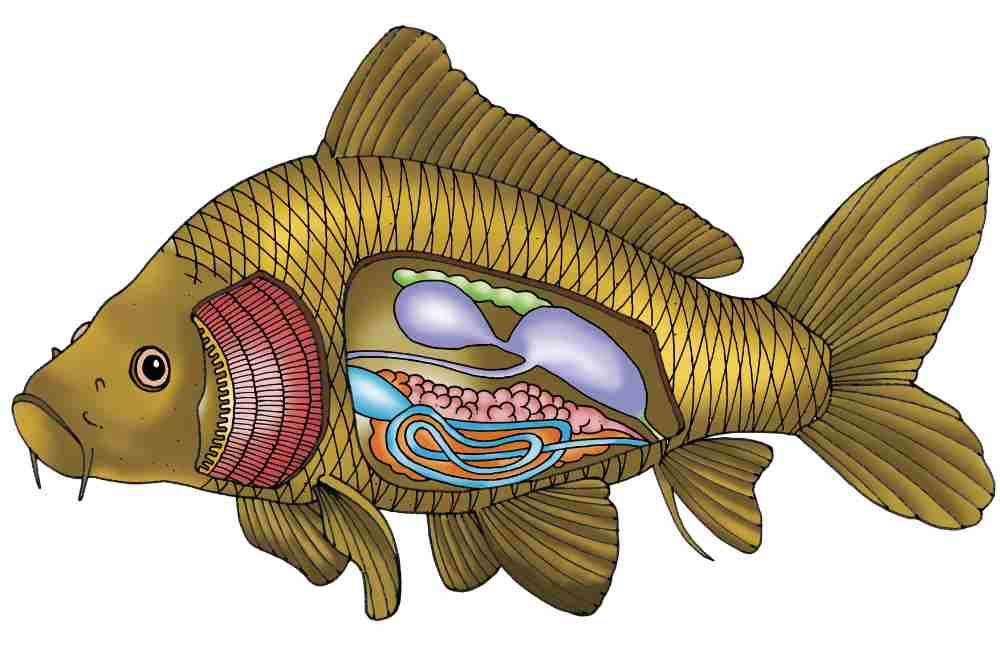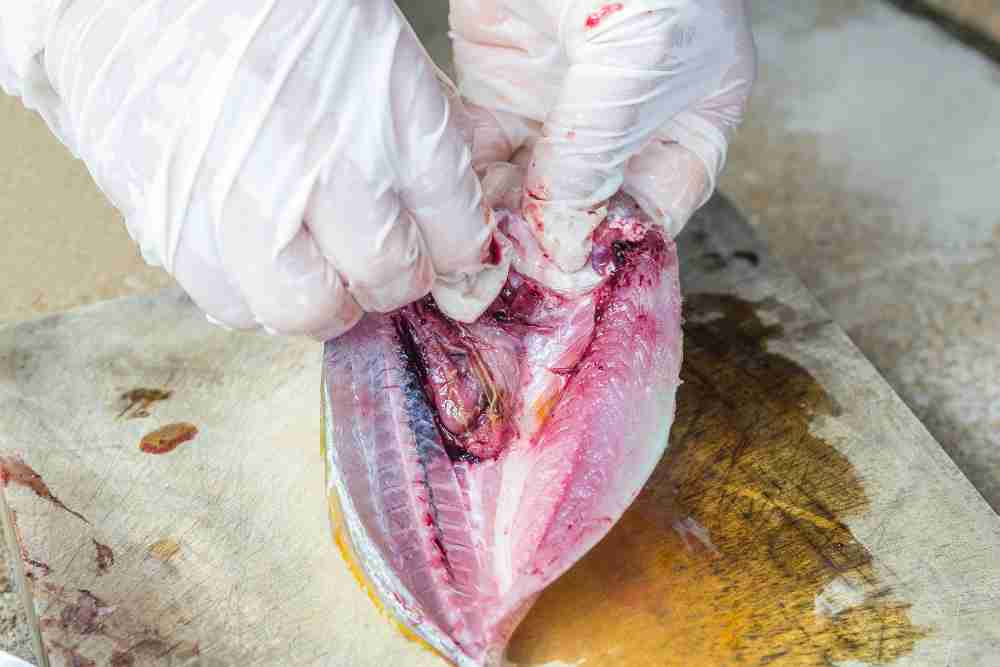Yes, fish have kidneys, which are responsible for filtering waste products from the bloodstream and maintaining the balance of fluids and electrolytes in the body.
The kidneys are located near the spine, just behind the gills, and are made up of small units called nephrons, which are lined with tiny blood vessels called capillaries.
Blood flows through the capillaries, and waste products are filtered out and excreted while the rest of the blood is returned to the body. The kidneys are an important organ in fish, and their proper functioning is essential for the overall health and well-being of the fish.
They are responsible for removing excess waste products, such as urea and ammonia, from the bloodstream and excreting them through the gills or urinary system.
The kidneys also play a role in regulating the balance of fluids and electrolytes in the body, as well as for secreting hormones and other substances.

Excretion in Fish | How Do Fish Excrete Waste
Excretion is the process by which waste products are eliminated from the body of an organism. In fish, excretion occurs through the gills, urinary system, and skin.
One of the main ways that fish excrete waste products is through the gills. The gills are specialized organs that allow fish to extract oxygen from the water and release carbon dioxide.
They are also responsible for eliminating waste products such as urea and ammonia from the body.
Fish also have a urinary system, which is responsible for eliminating waste products such as urea and creatinine from the body.
The urinary system consists of the kidneys, which filter the blood and remove waste products, and the ureters, which carry the waste products to the cloaca, a chamber at the base of the tail where they are excreted.
In addition to the gills and urinary system, fish also excrete waste products through the skin.
The skin is an important organ in fish and plays a role in the regulation of electrolytes and fluids in the body.
Waste products can be eliminated through the skin by diffusion, which is the movement of molecules from an area of higher concentration to an area of lower concentration.
Fish Kidney | Do Fish Have Kidneys
Fish kidneys the fish renal systems, are responsible for filtering and excreting waste products from the bloodstream. They are similar in function to the kidneys in humans and other mammals.
Fish kidneys are made up of small units called nephrons, which are responsible for filtering the blood and removing waste products.
The nephrons are lined with tiny blood vessels called capillaries, through which the blood is filtered. The filtered blood is then returned to the body, while the waste products are excreted through the gills or urinary system.
Fish kidneys are important for maintaining the balance of fluids and electrolytes in the body, as well as for removing waste products such as urea and ammonia.
Some fish, such as salmon and trout, also have a specialized organ called the swim bladder, which helps them regulate their buoyancy in the water.
Fish Kidney Location

Fish have one pairs of kidneys. These organs are located on the lower side of their body and remove waste from the body.
In most fish, the kidneys are located near the spine, just behind the gills.
Fish Kidney Structure
The structure of the fish kidney varies depending on the species of fish. In general, the kidney is a complex organ made up of several parts, including the renal cortex, renal medulla, and renal pelvis.
The renal cortex is the outer layer of the kidney and is responsible for filtering the blood and removing waste products.
It is made up of small units called nephrons, which are lined with tiny blood vessels called capillaries. Blood flows through the capillaries, and waste products are filtered out and excreted while the rest of the blood is returned to the body.
The renal medulla is the inner layer of the kidney and is responsible for regulating the balance of fluids and electrolytes in the body.
It is made up of a network of small tubes called tubules, which help to transport waste products and other substances throughout the kidney.
The renal pelvis is a central area of the kidney that receives blood from the renal arteries and returns it to the renal veins.
It is also responsible for collecting and transporting waste products to the urinary system for excretion.
Overall, the structure of the fish kidney is complex and is made up of several different parts that work together to filter the blood and maintain the balance of fluids and electrolytes in the body.
How many Kidneys Do Fish Have? Do Fish Have Two Kidneys?
Types of Kidney in Fishes
There are two main types of kidneys found in fish: the mesonephros and the metanephros.
The mesonephros, also known as the intermediate kidney, is found in most fish and is responsible for filtering waste products from the blood.
It is made up of small units called nephrons, which are lined with tiny blood vessels called capillaries.
The filtered blood is then returned to the body, while the waste products are excreted through the gills or urinary system.
The metanephros, also known as the permanent kidney, is found in more advanced fish species and has a more complex structure than the mesonephros.
It is made up of several layers of nephrons, which are responsible for filtering the blood and removing waste products.
The metanephros is also responsible for regulating the balance of fluids and electrolytes in the body, as well as for secreting hormones and other substances.
Both the mesonephros and the metanephros play important roles in the overall health and well-being of fish.
Dysfunction or damage to these organs can lead to serious health problems, including impaired kidney function and impaired regulation of electrolytes and fluids in the body.
Kidney Function in Fish
The main function of the kidney in fish is to filter waste products from the bloodstream and maintain the balance of fluids and electrolytes in the body.
The kidneys are responsible for removing excess waste products, such as urea and ammonia, from the bloodstream and excreting them through the gills or urinary system.
Fish kidneys are made up of small units called nephrons, which are lined with tiny blood vessels called capillaries.
Blood flows through the capillaries, and waste products are filtered out and excreted while the rest of the blood is returned to the body.
The kidneys also play a role in regulating the balance of fluids and electrolytes in the body. They do this by secreting hormones and other substances that help to regulate the amount of water and electrolytes in the body.
For example, the hormone vasopressin helps to regulate the amount of water in the body by increasing the absorption of water in the kidneys.
Dysfunction or damage to the kidneys can lead to serious health problems, including impaired kidney function and impaired regulation of electrolytes and fluids in the body.
Freshwater Fish Kidney vs Saltwater Fish Kidney: What Are the Differences
The kidney in freshwater fish and the kidney in saltwater fish play similar roles in filtering waste products from the bloodstream and maintaining the balance of fluids and electrolytes in the body.
However, there are some differences between the kidneys of freshwater fish and saltwater fish.
One of the main differences between the kidneys of freshwater fish and saltwater fish is their ability to regulate the concentration of electrolytes in the body.
Freshwater fish have kidneys that are adapted to excrete excess water and retain electrolytes, while saltwater fish have kidneys that are adapted to excrete excess electrolytes and retain water.
This difference is due to the different environments in which freshwater fish and saltwater fish live.
Freshwater fish live in environments where the concentration of electrolytes in the water is lower than the concentration of electrolytes in the body.
As a result, their kidneys are adapted to excrete excess water and retain electrolytes to maintain the balance of fluids and electrolytes in the body.
On the other hand, saltwater fish live in environments where the concentration of electrolytes in the water is higher than the concentration of electrolytes in the body.
As a result, their kidneys are adapted to excrete excess electrolytes and retain water to maintain the balance of fluids and electrolytes in the body.